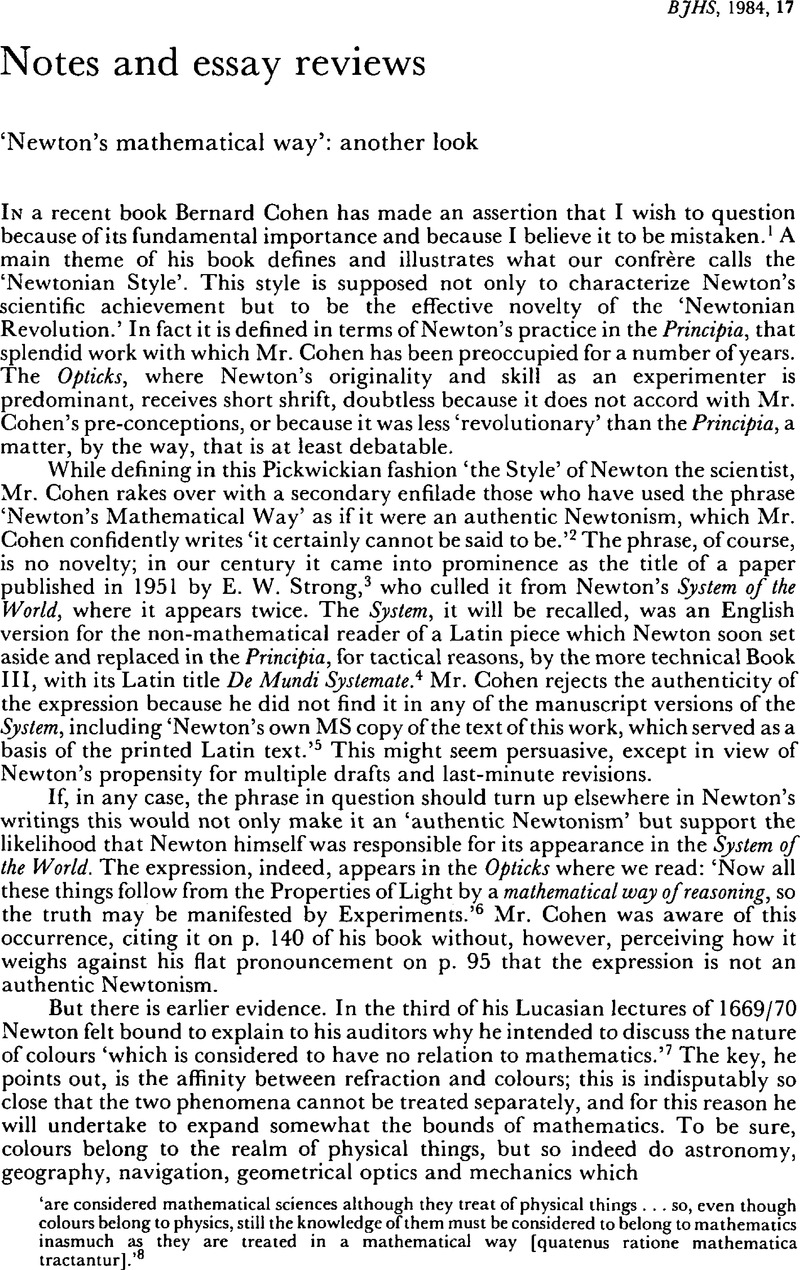No CrossRef data available.
Published online by Cambridge University Press: 05 January 2009

1 Cohen, I. Bernard, The Newtonian Revolution (Cambridge University Press, 1980).Google Scholar
2 Newtonian Revolution, p. 95Google Scholar. See also p. 15. Inexplicably, Mr. Cohen (p. 310, note 7) puts the onus on the editor of the Dictionary of the History of Ideas, rather than on the author of the piece that so offended him, the present impenitent writer.
3 Strong, E. W., ‘Newton's Mathematical Way’, Journal of the History of Ideas, 12, 1951, 90–110.CrossRefGoogle Scholar
4 The System was first published posthumously in 1728, in the same year as the Latin version. A second English edition appeared in 1731 and has been reproduced in facsimile (London, Dawson's of Pall Mall, 1969) with a valuable account of the history of the text in an introduction by Professor Cohen. See also Cohen, 's Introduction to Newton's Principia (Cambridge, Mass., 1971), p. 16, note 1.CrossRefGoogle Scholar
5 Newtonian Revolution, p. 95.Google Scholar
6 Opticks (1704), Book II, Part II, p. 44. Italics mine.Google Scholar
7 The Unpublished First Version of Isaac Newton's Cambridge Lectures on Optics 1670–1672 (Cambridge, The University Library, 1973)Google Scholar. This facsimile of MS. Add. 4002, has a short but useful introduction by D. T. Whiteside. My translation is from fol. 23.
8 MS. Add. 4002, fol. 23.
9 Principia (1687) p. 401Google Scholar (italics mine) and The Mathematical Principles of Natural Philosophy. By Sir Isaac Newton—Translated into English by Andrew Motte, 2 vols. (London, 1729), II, p. 201.Google Scholar
10 Newtonian Revolution, p. 95.Google Scholar
11 Ibid.
12 In Phillips, Edward, New World of Words, ed. Kersey, John (London, 1706)Google Scholar, where the definition reads:‘… the Word [Mathematicks] is now generally taken for certain noble Sciences, taught by true demonstration, and exercis'd about Quantity… These sciences are distinguished into Pure and Mixt, Speculative and Practical.’
13 The Correspondence of Isaac Newton, 7 vols. (Cambridge at the University Press, 1959–1977), I, 82–83.Google Scholar
14 Newton, Correspondence, I, 96Google Scholar. The word ‘naturalist’ simply meant ‘natural philosopher’ not commonly ‘experimental natural philosopher’ as Professor Cohen would have it. A contemporary dictionary defines a naturalist as ‘one who understands natural causes, or is skilled in Natural Philosophy.’ Phillips-Kersey (1706).
15 Newton, Correspondence, I, p. 113.Google Scholar
16 Newton, Correspondence, I, 187–188.Google Scholar
17 Opticks (1704), Book II, Part II, 47–48. Italics mine.Google Scholar
18 This distinction was essential to Newton's success in the physical investigation of colours; earlier in the Opticks (1704) he had stressed it in Book I, Part II, p. 120.Google Scholar
To send this article to your Kindle, first ensure no-reply@cambridge.org is added to your Approved Personal Document E-mail List under your Personal Document Settings on the Manage Your Content and Devices page of your Amazon account. Then enter the ‘name’ part of your Kindle email address below. Find out more about sending to your Kindle. Find out more about saving to your Kindle.
Note you can select to save to either the @free.kindle.com or @kindle.com variations. ‘@free.kindle.com’ emails are free but can only be saved to your device when it is connected to wi-fi. ‘@kindle.com’ emails can be delivered even when you are not connected to wi-fi, but note that service fees apply.
Find out more about the Kindle Personal Document Service.
To save this article to your Dropbox account, please select one or more formats and confirm that you agree to abide by our usage policies. If this is the first time you used this feature, you will be asked to authorise Cambridge Core to connect with your Dropbox account. Find out more about saving content to Dropbox.
To save this article to your Google Drive account, please select one or more formats and confirm that you agree to abide by our usage policies. If this is the first time you used this feature, you will be asked to authorise Cambridge Core to connect with your Google Drive account. Find out more about saving content to Google Drive.